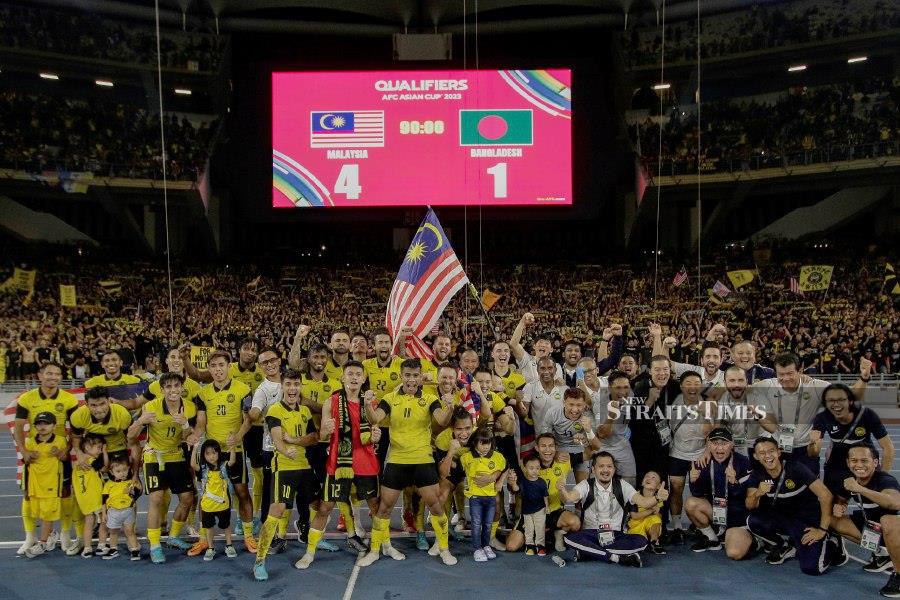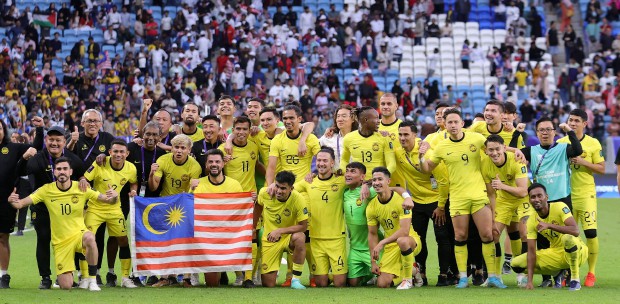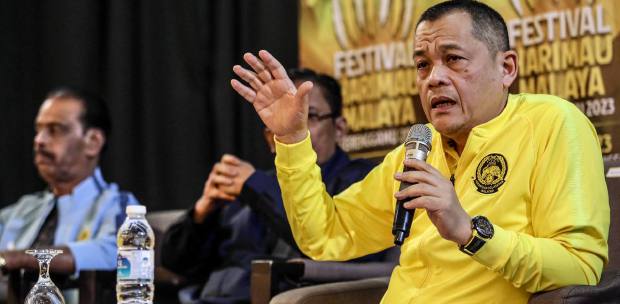THE joy and euphoria among players, coaches and fans alike accompanying Malaysia's qualification for the 2023 Asian Cup Finals on Tuesday was far removed from the first time the national team qualified for the 1976 edition.
The impact of this achievement — ending a 15-year wait in returning to Asian football's biggest stage — cannot be understated. Unlike 44 years ago when the FA of Malaysia (FAM) stunned the nation by withdrawing the team just two weeks before Malaysia's opening match in Tabriz, Iran.
Malaysia defeated Bangladesh 4-1 in Bukit Jalil to secure a fourth appearance at the Asian Cup after qualifying for 1976 and 1980 and co-hosting the 2007 edition.
Former Kedah coach Azraai Khor was part of that 1976 squad that was belatedly assembled after FAM reversed course and reflected how attitudes have changed with national coach Kim Pan Gon's squad provoking an outpouring of emotion across the land.
"Congratulations to the boys, they worked hard and deserved it," said Azraai, whose contemporaries in 1976 included Mokhtar Dahari, R. Arumugam, Santokh Singh, Shukor Salleh and Isa Bakar.
"As an ex-player, I feel proud of what they have done, especially after failing to qualify on merit for so long. This group is very promising. Pan Gon has moulded this team into a confident bunch."
Azraai believes Pan Gon will be able to keep the players' feet on the ground as he prepares the side for the tougher matches at the Finals after finishing second in qualifying Group E, behind Bahrain.
"I'm sure he has his plans, having evaluated the players and identified areas to improve. He may have to look around for more players to account for injury and loss of form, but the important thing is to maintain a focus towards the Finals," said Azraai.
Azraai picked striker Darren Lok and midfielder Syamer Kutty Abba as the fulcrum of the team while highlighting the leadership role of Dion Cools.
"For Darren to return to play in the Super League so impressively after his injury last season is remarkable. He showed great character and is a far better choice than Guilherme De Paula, who has not proven himself," added Azraai.
"Syamer impressed me in midfield, protecting the defenders and making their lives easier with his interceptions and by running up and down. Cools has also come into the team and shown great attitude and leadership."
When the squad travels to the Asian Cup next year, every player in the team will be making his Finals debut, much like it was for Azraai and his teammates in 1976.
"It was an eye-opening experience as it was my first time in the Middle East and playing against quality opposition," recalled Azraai.
"We had to adapt to the environment. It was cold because the venue was on high ground, the food was different and even the political climate was charged.
"It was a great experience even though we had very little time to prepare. We also had to overcome the shock of FAM first announcing that we would not be going and then finding out through the New Straits Times a week later that we would be going after all, along with the names of the players called up."
The confusion around the team's fate left coach M. Kuppan and his players just four days to train before flying to Teheran and, in the circumstances, did well to just miss out on a semi-final place on goal difference.
Malaysia qualified for the 1976 Asian Cup without any fanfare despite an impressive qualifying campaign in Bangkok with wins over South Korea, Thailand and South Vietnam and a draw with Indonesia to finish top of the group unbeaten and conceding only one goal.
At the time, however, Malaysians were preoccupied with the Malaysia Cup, which among the many perplexing decisions made by FAM in their long history, continued as the national team embarked on their qualifying mission in March 1975.
Worse was to follow the following year when FAM dropped a bombshell in announcing the withdrawal of the national team from the Asian Cup on the back of a winless seven-match tour of China and North Korea which included two defeats to Chinese provincial sides and a 5-0 thrashing by the North Korean Army.
NST reported FAM's secretary at the time, Datuk Kwok Kin Keng, as saying that the withdrawal — decided by a five-man emergency committee — was to avoid a "senseless humiliation" in Iran due to the dismal display in China and North Korea "where our reputation as the 1974 Asian Games bronze medallists was shot to pieces."
Following a public backlash, FAM reversed course a week later yet the national body's maladroit handling of what should have been a celebrated historic occasion for Malaysian football did not deter the national players from making the country proud, coming within minutes of reaching the semi-finals.
Only six teams competed in the Finals following the withdrawals of Saudi Arabia and Thailand. The teams were in two groups of three, with the top two advancing to the semi-finals.
Malaysia lost 2-0 to Kuwait in the group's opening match and held China 1-1, but China knew they would advance to the semi-finals even if they lost to Kuwait by a single goal in the last fixture.
In the event, Kuwait won 1-0 and Malaysia's late concession of an equaliser to China, having led through Mokhtar Dahari's 50th-minute strike, in hindsight, was all that separated the national team from a historic place in the semi-finals.
The next four years brought much success to the national team, which might not have come to pass had FAM stuck to its decision to forego the Asian Cup.
Not only did Malaysia return to the Asian Cup in 1980 but the national team also won the Merdeka Tournament twice, including the 1976 edition just two months after returning from Iran, back-to-back Sea Games gold medals (1977 and 1979), the 1978 Thai King's Cup and qualifying for the 1980 Olympics.





